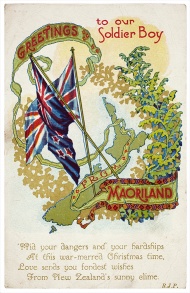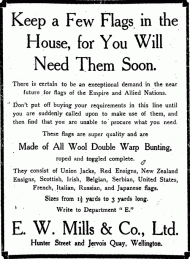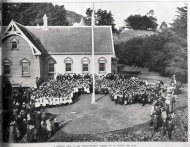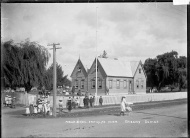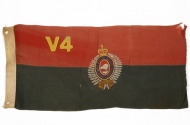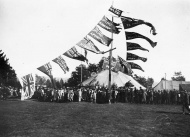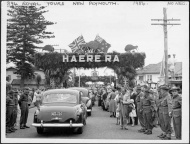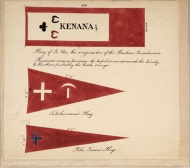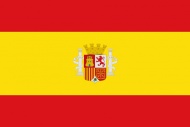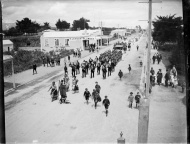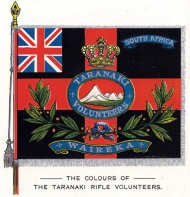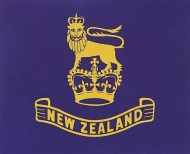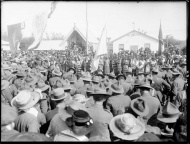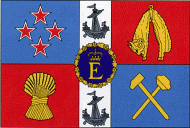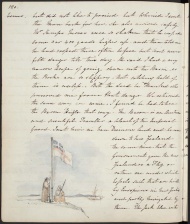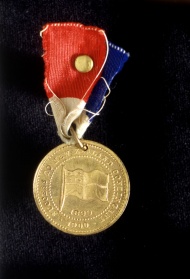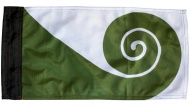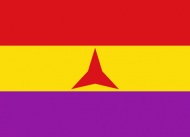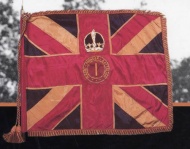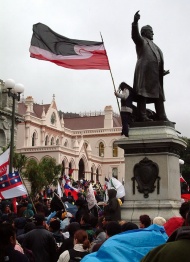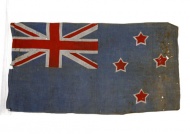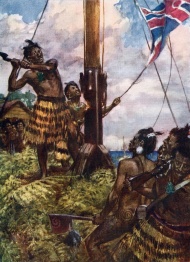Events In History
-
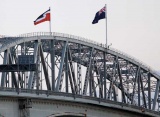 14 December 2009Cabinet endorses Tino Rangatiratanga flag
14 December 2009Cabinet endorses Tino Rangatiratanga flagThe government recognised the Māori (Tino Rangatiratanga) flag as the preferred national Māori flag. Read more...
-
 12 June 1902New Zealand flag confirmed
12 June 1902New Zealand flag confirmedThe New Zealand blue ensign that had been adopted for use on government ships in 1869 was proclaimed as ‘the recognised flag of the colony' Read more...
-
 23 October 1869New Zealand ensign proclaimed
23 October 1869New Zealand ensign proclaimedThe design of the New Zealand ensign that was to be flown by ships owned by the colonial government was established by a proclamation by the governor, Sir George Bowen Read more...
-
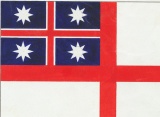 20 March 1834New Zealand's first recognised flag chosen
20 March 1834New Zealand's first recognised flag chosenA New Zealand flag was first suggested in 1830 after Sydney customs officials seized a Hokianga-built ship. Read more...
Articles
Empire Day

Empire Day (24 May), celebrated widely in New Zealand from 1903, was a major event in the viceregal calendar.
- Page 1 - Empire DayEmpire Day (24 May), celebrated widely in New Zealand from 1903, was a major event in the viceregal
He Whakaputanga - Declaration of Independence
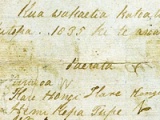
On 28 October 1835, 34 rangatira signed He Whakaputanga o te Rangatiratanga o Nu Tireni (the Declaration of Independence of the United Tribes of New Zealand).
- Page 1 - Declaration of Independence On 28 October 1835, 34 rangatira signed He Whakaputanga o te Rangatiratanga o Nu Tireni (the Declaration of Independence of the United Tribes of New
Flags of New Zealand
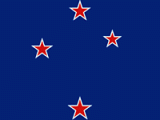
The New Zealand flag hasn't always been our official flag. It was adopted in 1902, replacing the Union Jack. Between 1834 and 1840, the flag of the United Tribes was recognised as our first 'national' flag. Waitangi Day 2010 saw the first official recognition of the national Māori flag.
-
Page 2 – United Tribes flag
On 20 March 1834, 25 chiefs from the Far North and their followers gathered at Waitangi to choose a flag to represent New Zealand.
-
Page 3 – Union Jack
The Union Jack served as New Zealand's flag from 1840 until 1902
-
Page 4 – The NZ flag
The maritime origins of the New Zealand flag from 1865 to 1902
-
Page 5 – Other official flags
Six flags other than the New Zealand flag are flown for official purposes in New Zealand.
-
Page 6 – The national Māori flag
A history of the national Māori (Tino Rangatiratanga) flag
-
Page 7 – Flag debates
The design and use of the national flag has always attracted debate
-
Page 8 – Flag referenda
In 2016 New Zealanders voted to keep the current national flag.
-
Page 9 – Further information
Find out more about New Zealand's flags
Schools and the First World War

Schools and children were quickly called into action at the outset of the First World War in 1914. Developing patriotic, fit and healthy citizens was seen as important to the survival of the country and the Empire. Hundreds of teachers joined the NZEF, including many from sole-teacher schools. Almost 200 never returned.
- Page 3 - Displaying patriotismIn late 1917 district education boards ordered that children salute the New Zealand flag at the start of each school day. Some teachers opposed this as too
Taming the frontier
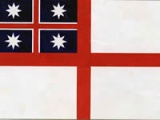
In 1832 James Busby was appointed as the official British Resident to New Zealand. After arriving in the Bay of Islands in May 1833 he took steps to tame what he saw as a chaotic frontier society.
- Page 3 - Choosing a flagThe selection of the flag of the United Tribes of New Zealand as New Zealand's first flag
Armistice Day
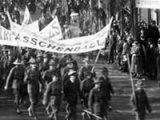
After four terrible years, fighting in the First World War finally ended with the signing of an armistice between Germany and the Allies on 11 November 1918. New Zealanders celebrated enthusiastically, despite having recently celebrated the surrenders of the three other Central Powers and the premature news of an armistice with Germany.
- Page 3 - False armisticeOn 7 November 1918 the Prime Minister assured the public - following rumours to the contrary - that the government was not holding back news of a German surrender. The next
New Zealand's 19th-century wars
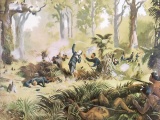
War changed the face of New Zealand in the 19th century. Many thousands of Māori died in the intertribal Musket Wars between the 1810s and the 1830s. There were more deaths during the New Zealand Wars of the 1840s to 1870s between some Māori and the Crown, which for many tribes had dire consequences.
- Page 6 - NZ Wars flagsMany Maori in the 19th century saw the Union Jack as a potent symbol of Great Britain's power in New Zealand. In the New Zealand Wars, Maori who resisted government forces often
Biographies
-
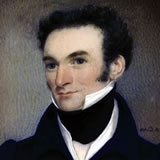 Busby, James
Busby, James
Edinburgh-born James Busby was British Resident, a consular representative, in New Zealand from 1833. Based at Waitangi in the Bay of Islands, he was given little material support to achieve British policy aims, but in early 1840 he helped William Hobson draft the Treaty of Waitangi.
Read more...
Related keywords
- john key
- postal service
- WW1
- christmas
- poetry
- borneo confrontation
- royal navy
- shipping
- armistice
- advertising
- maori
- famous firsts
- influenza pandemic
- germany
- newspapers
- training camps
- education
- primary schools
- school journal
- children
- opotiki
- teacher
- vietnam war
- war objects
- waitangi day
- navy
- korean war
- cold war
- united nations
- 1950s
- aviation
- maori leaders
- pai marire
- te kooti
- new zealand wars
- kingitanga
- le quesnoy liberation
- france
- prince of wales
- rotorua
- 1920s
- governor-general
- queen elizabeth
- new plymouth
- royal tours
- te ua haumene
- spanish civil war
- moutoa
- whanganui war
- levin
- parades
- clothing
- taranaki
- south african war
- potatau te wherowhero
- samoa
- mau movement
- pioneer battalion
- maori in war
- shannon
- ringatu
- whanganui city
- putiki
- united tribes
- new zealand company
- medals
- boer war
- german samoa occupation
- german navy
- waitangi
- royal new zealand air force
- james busby
- protest
- hikoi
- tino rangatiratanga
- pre-1840 contact
- gallipoli campaign
- quinns post
- canterbury infantry regiment
- public holidays
- empire day
- charles bledisloe
- olympics
- australia
- royal new zealand navy
- richard seddon
- kororareka
- hone heke
- painting
- northern war
- sesquicentenary
- treaty of waitangi
- declaration of independence
- cms
-
Main image: The Flag Consideration Panel
In February 2015 the government announced the appointment of the Flag Consideration Panel, which would ‘design and lead the public engagement process’ around the flag




